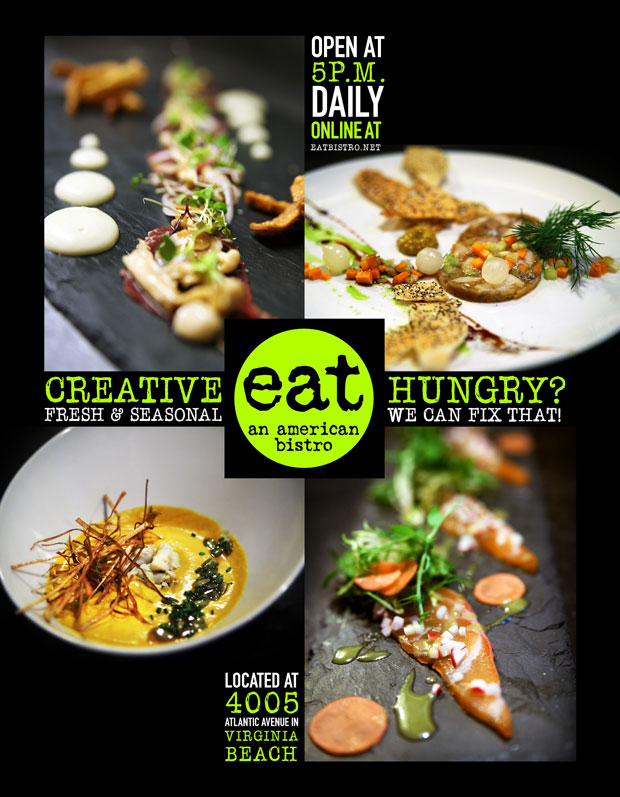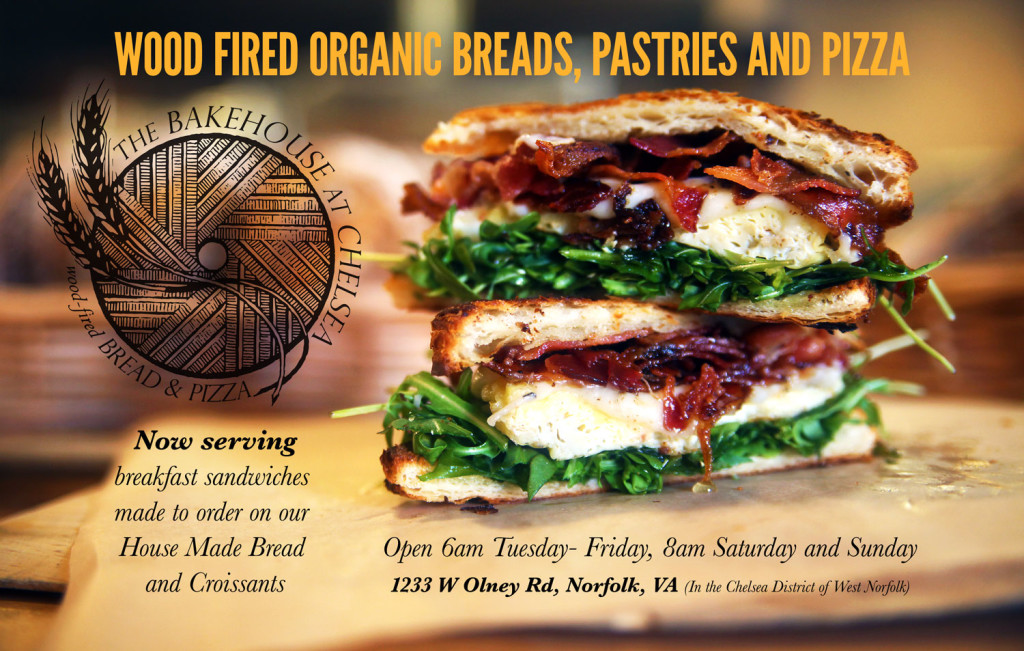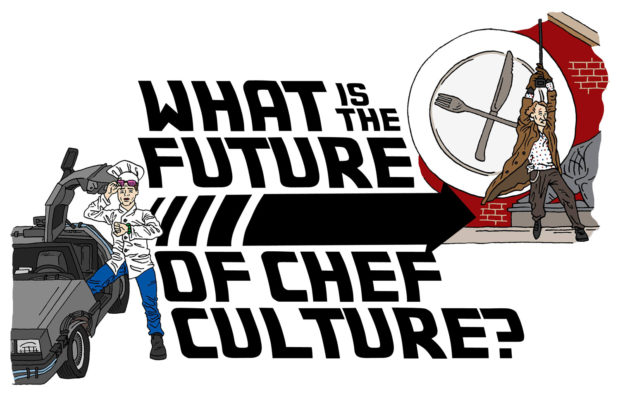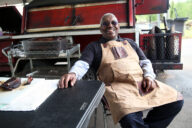Article by David Hannah
Illustration by Matt Harrison
To be a chef in 2016 can mean so many different things to so many different people — you can be a craftsman, a teacher, a corporate suit, an annoying boss, or even a celebrity. I often wonder: what is the future of chef culture? What does it mean to be a chef in this day and time? What does the younger generation of children think it means to be a chef? As a new father, I often wonder, if my son decides to be a chef, will he have the same motivations I did. Will the craft of cooking have the same value for him as it did for me?
On a similar note, as a Hip Hop fan, I’ve noticed that there is a loud crop of the new generation rappers that want nothing to do with the era before them. They don’t even acknowledge the existence of icons such as Tupac Shakur. There are parallels of that nature in the chef community. You have the modernist chef versus the “old school,” classically trained chef. There’s the guy who makes everything deconstructed — a gel, a foam, or some sort of spherification — versus the guy who pisses at the thought of foams. This same chef may also think that sous vide eggs aren’t even on the level of traditional poached eggs (which is an insane thought). Then you have the guy who stays true to his region and only cooks with locally sourced ingredients, versus the guy who wants to be global and import all of his ingredients. There are guys who are true to a certain culture, versus the guys who wants to capitalize on certain trends. An example of the latter is a chef who is either from Japan or trained in Japanese cuisine who brings authentic flavors and techniques to their menu, versus the chef that puts ramen, alongside steaks and burgers on their menu due to popularity. None of these mindsets are technically in the wrong as a chef, and I’m of no authority to say how a chef should feel or operate. However, it does beg the question for the future of chef culture: what will our motivations be?
When I was coming up as a cook, I was motivated by the skills, pallets, and knowledge of the other cooks and chefs. I was inspired by more seasoned cooks on the line. I would always ask them questions about their experiences. I would ask them about certain techniques. I wanted to soak in as much knowledge as possible, because at that time I was motivated to gain as much knowledge as possible. As I gained more experience, my motivations changed from gaining knowledge to honing my skills, to creating moments with my food. I want my food to create lasting memories with people, but these are just my motivations and I’m sure I have a lot of chef colleagues who share the same. My friend Jarrell Williams of Nomarama (and a lover of all things food and small business) hopes chefs are motivated and inspired by the communities they serve and are a part of. I agree with him and I share that same hope as him. Chef Nic Hagen (of Home Grown) is motivated by his community — the smiles on his customers faces when they eat his food drives him on a day to day basis.
However, in the same light, we chefs are all different. We aren’t built the same. The culture around us has rapidly changed in the past decade: ten years ago you busted your ass on the line and kept it up for years on end. Then you moved on to a fine dining restaurant to learn under a top notch chef, or maybe you moved up to sous chef, or chef de cuisine. Then, after that self-same decade in the game, you opened your own spot. Once your spot was open you started the busting-your-ass cycle all over again: first, to make sure your business stays open; and then, to make your establishment a local name. If you’re are blessed enough, you become a nationally recognized. Then, just maybe, you get a cookbook or even a television show. It could take 20 years to get that point.
——————————————————————————————————–

Creative, Fresh, Seasonal! For More on Eat An American Bistro visit them HERE or click the flier above!
——————————————————————————————————–
Things are different now. The younger generation won’t have to wait 20 years to achieve this success. With technology and the internet giving us access to every single culinary secret in the world, they won’t have to work as hard to squeeze information out of their sous chef, as before. That’s not necessarily a bad thing, but it’s not necessarily a good thing either. Makes you wonder, how does the 14-year-old future chef think? If he or she knows they don’t have to bust their ass on the sauté station for 5 years before they become sous chef. Will they even want to learn how to sauté? I’ve read a lot of articles this year about how hard it’s been for restaurants to find good cooks, saying that cooks are coming less skilled than ever before. Is it because the younger generation is more motivated by the title of “chef” than to actually learn certain cooking skills necessary to be called that?
We’re a fame driven society. The internet, YouTube, social media, and TV. allows it all to happen. I’m grateful for our modern day mediums. Without them, people wouldn’t know who Regular Chef is, and probably wouldn’t know about Regular Chef Jams. If it wasn’t for social media, I wouldn’t have the great friend- ships with some of my chef homies that I have now. A big “however,” though: the internet can be a huge illusion. Social media, in particular, can make it look like a chef who posts nothing but crazy grilled cheese sandwiches and has 8,000 followers on Instagram is more successful than a chef who focuses on French cuisine and has 700 followers. None of that is relevant when it comes to skills or success. YouTube is the same; the amount of views you get doesn’t equate to success or skill level. What it does do is showcase a level of visibility. Even that can be contradictory, because the audience that is looking at crazy grilled cheese sandwiches isn’t the same audience looking a French cuisine.
——————————————————————————————————–

Simply one of the freshest and best breakfasts available in Norfolk! Visit The Bakehouse at Chelsea online HERE or click the image above!
——————————————————————————————————–
Visibility can be like a drug when it comes to some chefs. You want to be written about. You want to be photographed. You want your cuisine to be all over the blogs and Instagram. A high level of visibility can equate with success. With the abundance of cooking competition shows, you’re likely to see some of the same cooks mentioned across episodes and networks. For every good show like “Mind of a Chef”, “Chef’s Table”, “Cooked”, “Top Chef”, and “Chopped,” there are the clownish entities of “Hell’s Kitchen”, “Cutthroat Kitchen”, and “Worst Cooks in America”. These shows can be like merit badges to some chefs now. A chef could pad his or her résumé with show appearances to try and out-qualify another chef, which, in certain circumstances isn’t true. A television appearance doesn’t prove if you can run a restaurant, manage a kitchen, or calculate food cost, just that you have been seen on TV.
To try and determine the future of chef culture (which is probably an impossible task), we have to redefine what it means to be a chef. To quote Meek Mill: “There’s levels to this.” Just as you can’t compare the viral You- Tube sensation to the chef whose restaurant has 3 and 4 star reviews, you also can’t look at the certified master chef in the same light as the winner of Gordon Ramsey’s show. Neither two compare — they shouldn’t even be in the same category. What it comes down to is skill. A chef should be judged by what they cook and how they cook. Not necessarily where they cook, because some of the best meals come from mom and pop restaurants, grease spot diners, and food trucks. Judge a chef’s greatness or success by the technique they use, their flavor profile, and how their food resonates with diners. The focus should be on their cooking skills, not followers or views. The future of the chef culture, I hope, is finding the right balance between skills and visibility. I want highly skilled chefs to be showcased. I want the certified master chefs to be advertised just as much as every random former child star from the 90s that has a new show on the cooking channel. (Talking about you, Tiffani Amber Thiessan.) In a perfect world, that would be the case, but I know this world isn’t perfect. I’m just hoping for a little bit of change instead of more of the same.








1 Comment
Well said, chef